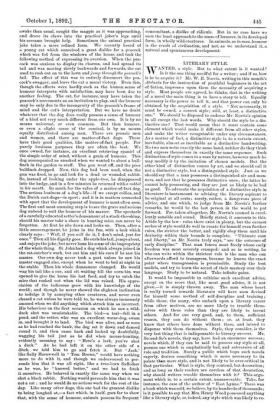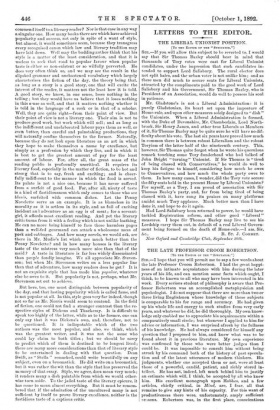LITERARY STYLE.
WANTED, a style. But to what extent is it wanted? Is it the one thing needful for a writer; and if so, how is he to acquire it ? Mr. W. E. Norris, writing in this month's Atalanta for the instruction of youthful beginners in the art of fiction, impresses upon them the necessity of acquiring a style. Most people are agreed, he thinks, that in the writing of a novel the main thing is to have a story to tell. Equally necessary is the power to tell it, and that power can only be obtained by the acquisition of a style. " Not necessarily, it must be owned, a correct style ; still, at least, a distinctive one." We should be disposed to endorse Mr. Norris's opinion in all except the last words. Why should the style be a dis- tinctive one ? That would mean that it must contain some element which would make it different from all other styles, and make the writer recognisable under any circumstances. As a matter of fact, a distinctive style is, to a certain extent, inevitable, almost as inevitable as a distinctive handwriting. No two men write exactly the same hand, neither do they think and express themselves in exactly the same sequence. Such distinction of style comes to a man by nature, however much he may modify it by the imitation of chosen models. But the other kind of distinction comes by art, and we should call it not a distinctive style, but a distinguished style. Just as we should say that a man possesses a distinguished air and man- ners, and not that he possesses distinctive ones ; the latter he cannot help possessing, and they are just as likely to be bad as good. To advocate the acquisition of a distinctive style in literature is tantamount to advising the literary aspirant to be original at all costs ; surely, rather, a dangerous piece of advice, and one which, to judge from Mr. Norris's further remarks, he would be the last person in the world to put forward. For, taken altogether, Mr. Norris's counsel is excel- lently sensible and sound. Briefly stated, it amounts to this. Abide by the law : rules there exist in plenty, but the earnest seeker of style would do well to create for himself even further rules, the stricter the better, and rigidly obey them until his dexterity within their bounds is complete. "Ultimate ease and liberty," as Mr. Norris truly says, "are the outcome of early discipline." That man fences most freely whose early freedom was most severely cramped : and so in writing, he who can write within the strictest rule is the man who can afterwards afford to transgress, because he knows the exact point where transgression is permissible. Study the best models, and try to learn the secret of their mastery over their language. Study to be natural. Take infinite pains.
It would be impossible to criticise such excellent advice, except on the score that, like most good advice, it is not given,—it is simply thrown away. The man whose heart is really turned towards literature will have soon devised for himself some method of self-discipline and training ; while those, the many, who embark upon a literary career from other motives, are no more likely to trouble them- selves with these rules than they are likely to invent others. And for one very good, and, to them, sufficient reason, they can do without them ; or, at least, they know that others have done without them, and intend to dispense with them themselves. Style, they consider, is the very last thing that is indispensable to literary success. Mr. So-and-So's novels, they say, have had an enormous success ; novels which, if they can be said to possess any style at all, possess one which is emphatically bad, and subversive of all rule and tradition. Surely a public which buys such novels eagerly, desires something which is more necessary to its palate than mere style, and is not likely to be over-critical in that particular. What is style, they contend, but decoration ; and as long as their readers are careless of that decoration, why should writers trouble themselves with it ? This argu- ment which is, to a certain extent, unanswerable. Take, for instance, the case of the author of " East Lytine." There was a book which was sold, we believe, by its hundreds of thousands ; is it possible to say that Mrs. Henry Wood possessed anything like a literary style, or, indeed, any style which was likely to re- commend itself to a literary reader? Nor is that case in any way a singular one. How many books there are which have achieved popularity and success, not only in spite of a want of style, but almost, it would sometimes seem, because they transgress every recognised canon which law and literary tradition may have laid down. Well may the budding author think that his style is a matter of the least consideration, and that it is useless to seek that road to popular favour when popular taste is either so non-existent or so wilfully perverted. He does very often think so, and we may see the result in the slipshod grammar and unchastened vocabulary which largely characterises the fiction of the day, the theory being that, as long as a story is a good story, one that will excite the interest of the reader, it matters not the least how it is told. A good story, we know, in one sense, loses nothing in the telling ; but they would have us believe that it loses nothing in this sense as well, and that it matters nothing whether it is told in the language of a cook or in that of a scholar. Well, they are quite right—from their point of view. But their point of view is not a literary one. Their aim is not to produce good work, but work which will sell; and as long as the indifferent and unelaborated labour pays them as well, or even better, than careful and painstaking productions, they will naturally confine themselves to the former. Naturally, because they do not look upon literature as an art in which they hope to make themselves a name by excellence, but simply as a profession by which they live, and in which it is best to get the greatest amount of pay for the least amount of labour. For, after all, the great mass of the reading public is profoundly uncritical. It requires its literary food, especially in the matter of fiction, to be hot and stror g that is to say, fresh and exciting ; and is cheer- fully indifferent to the manner in which the food is served. Its palate is not a nice one, because it has never suffered from a surfeit of good food. For, after all, nicety of taste is a kind of fastidiousness which only comes to those who are Math, surfeited with common dishes. Let the Penny Novelette serve as an example. It is as blameless in its morality as it is artless in its style, and as full of exciting incident ani adventure as an egg is of meat ; for a servant- girl, it affords most excellent reading. And yet the literary critic turns from it with a feeling which is not unlike loathing. He can no more bring himself to face those harmless pages than a well-fed gourmand can attack a wholesome mess of pork and cabbages. And how many novels, we would ask, are there in Mr. Mudie's list which are much better than the Penny Novelette ? and in how many houses is the literary taste of the mistress very much more nice than that of the maid ? A taste in literature is far less widely disseminated than people fondly imagine. We all appreciate Mr. Steven- son ; but when Mr. Stevenson writes on a less popular line than that of adventure, how many readers does he get ? It is not an exquisite style that has made him popular, whatever else he owes to it. But popularity is not, perhaps, what Mr. Stevenson set out to achieve.
Bat here, too, one must distinguish between popularity of the day, and that lasting popularity which is called fame, and is not popular at all. In this, style goes very far indeed, though not so far as Mr. Norris would seem to contend. In the field of fiction, one could not find a stronger contrast than the re- spective styles of Dickens and Thackeray. It is difficult to speak too highly of the latter, while as to the former, one can only say that it was Dickens's own, and, therefore, not to be questioned. It is indisputable which of the two authors was the most popular, and also, we think, which was the greatest writer, and it was not the same who could lay claim to both titles ; but we should be sorry to predict which of them is destined to be longest lived ; there are many more considerations than that of literary style to be entertained in dealing with that question. Dean Swift, as " Stella " remarked, could write beautifully on any subject, even on a broomstick. He did write on a broomstick, but it was rather the wit than the style that has preserved the memory of that essay. Style, we agree, does mean very much ; it renders many a dish palatable from which we would other- wise turn aside. To the jaded taste of the literary epicure, it has come to mean almost everything. But it must be remem- bered that if the admiration of the uncultured many is not sufficient by itself to prove literary excellence, neither is the fastidious taste of a captious critic.



































 Previous page
Previous page